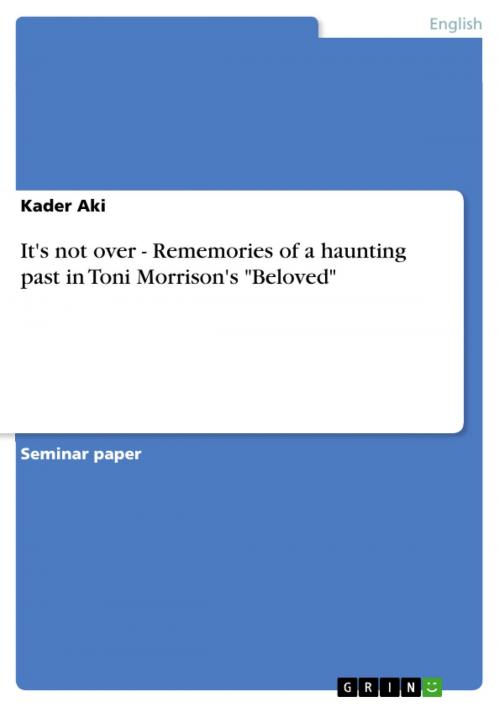It's not over - Rememories of a haunting past in Toni Morrison's 'Beloved'
Rememories of a haunting past in Toni Morrison's Beloved
Nonfiction, Entertainment, Drama, Anthologies| Author: | Kader Aki | ISBN: | 9783638518673 |
| Publisher: | GRIN Publishing | Publication: | July 8, 2006 |
| Imprint: | GRIN Publishing | Language: | English |
| Author: | Kader Aki |
| ISBN: | 9783638518673 |
| Publisher: | GRIN Publishing |
| Publication: | July 8, 2006 |
| Imprint: | GRIN Publishing |
| Language: | English |
Seminar paper from the year 2003 in the subject American Studies - Literature, grade: sehr gut, University of Cologne (Anglistik), course: (Re)writing History in the Novel, 12 entries in the bibliography, language: English, abstract: The horrors of slavery are commonly dismissed with comments such as 'it's over; it's done'. However, with Beloved Toni Morrison demonstrates how history is not over and done with. Morrison allows the reader to re-vision and understand African-American history through nonwestern eyes by re-telling history through the lives of former African slaves. American history is reconceptualized by this novel, which is concerned with historical transmission of a racial trauma. 'Beloved' places historical trauma at the center of American race relations and reveals two denials of historical trauma through unveiling the two types of violence; the interracial and 'intraracial'. The racist institutional power denied the violation of African American lives, and the black society refused to admit the truth of African American familial self-destruction and self-hatred. Morrison' s Beloved is a revelation of this trauma portrayed by apocalyptic events, such as infanticide. Infanticide is a motif that occurred already before Christ. Children were seen as properties of their parents who thought to have the 'right' to kill them for example because of poverty. This paper tries to analyse and explain the infanticide which Sethe commits, from different points of view. It shows how Sethe 'legitimates' or explains her act. This is followed by a section with a closer focus on the phenomenon trauma and healing. The last chapter discusses weather the characters surrounding her have the right to judge her or not.
Seminar paper from the year 2003 in the subject American Studies - Literature, grade: sehr gut, University of Cologne (Anglistik), course: (Re)writing History in the Novel, 12 entries in the bibliography, language: English, abstract: The horrors of slavery are commonly dismissed with comments such as 'it's over; it's done'. However, with Beloved Toni Morrison demonstrates how history is not over and done with. Morrison allows the reader to re-vision and understand African-American history through nonwestern eyes by re-telling history through the lives of former African slaves. American history is reconceptualized by this novel, which is concerned with historical transmission of a racial trauma. 'Beloved' places historical trauma at the center of American race relations and reveals two denials of historical trauma through unveiling the two types of violence; the interracial and 'intraracial'. The racist institutional power denied the violation of African American lives, and the black society refused to admit the truth of African American familial self-destruction and self-hatred. Morrison' s Beloved is a revelation of this trauma portrayed by apocalyptic events, such as infanticide. Infanticide is a motif that occurred already before Christ. Children were seen as properties of their parents who thought to have the 'right' to kill them for example because of poverty. This paper tries to analyse and explain the infanticide which Sethe commits, from different points of view. It shows how Sethe 'legitimates' or explains her act. This is followed by a section with a closer focus on the phenomenon trauma and healing. The last chapter discusses weather the characters surrounding her have the right to judge her or not.















